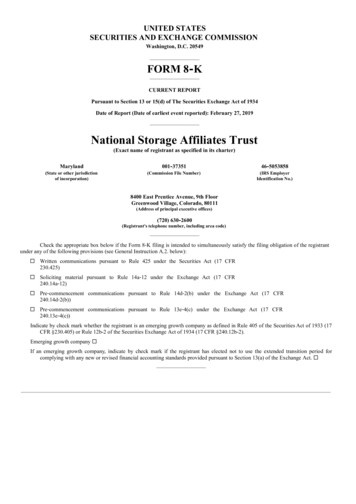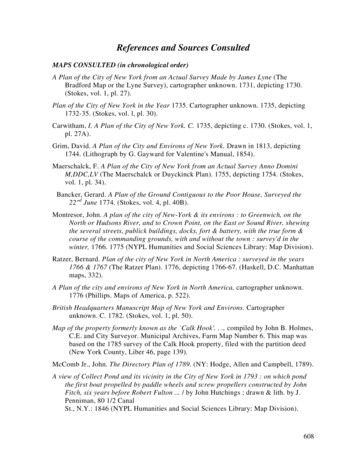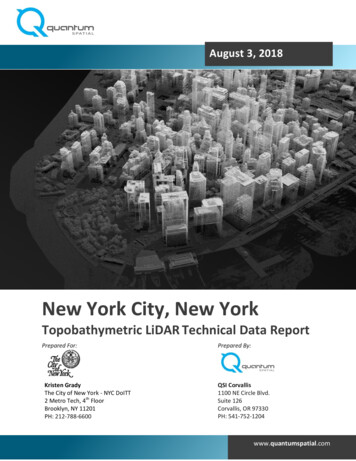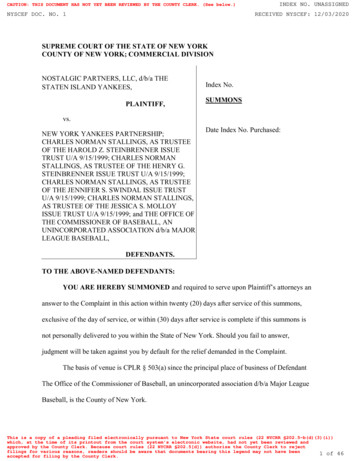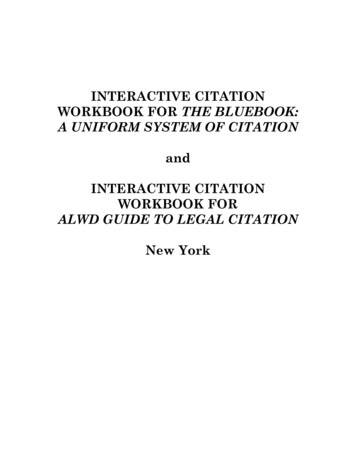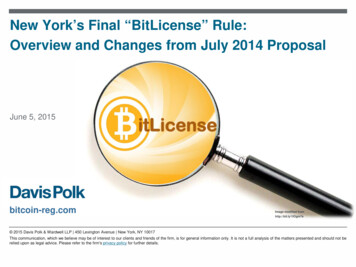
Transcription
New York’s Final “BitLicense” Rule:Overview and Changes from July 2014 ProposalJune 5, 2015itLicensebitcoin-reg.comImage modified fromhttp://bit.ly/1lOgm7e 2015 Davis Polk & Wardwell LLP 450 Lexington Avenue New York, NY 10017This communication, which we believe may be of interest to our clients and friends of the firm, is for general information only. It is not a full analysis of the matters presented and should not berelied upon as legal advice. Please refer to the firm's privacy policy for further details.
Table of ContentsIntroduction1. Introduction Summary of Changes from and Clarifications to the July 2014 ProposalSummary of RequirementsTimeline2. What Is Covered Under BitLicense?3. Application Process, Suspension and Revocation4. Consumer Protections5. Safeguarding Assets6. Cyber Security Program7. Anti-Money Laundering8. Exams, Reports and Oversight1bitcoin-reg.com
IntroductionWe have a responsibility to regulate new financial products in order to help protect consumersand root out illicit activity. That is the bread and butter job of a financial regulator. However, bythe same token, we should not react so harshly that we doom promising new technologiesbefore they get out of the cradle. Getting that balance right is hard, but it is key.Blackline of Final Rule vs. Feb2015 Reproposal– NYDFS Superintendent Benjamin Lawsky, Speech Announcing BitLicense Final Rule (Jun. 3, 2015) On June 3, 2015, the New York Department of Financial Services (“NYDFS”) issued itsfinal “BitLicense” virtual currency ruleIn response to nearly 4,000 comment letters on the “July 2014 Proposal” and 35comments on the “February 2015 Reproposal,” the NYDFS made a number of changesand clarifications, such as adding a 2-year conditional license and loosening certainAnti-Money Laundering (“AML”) / Know Your Customer (“KYC”) requirements (seeSlide 4 for summary of changes)Comment Letter Summary(Nov. 7, 2014)Most virtual currency (e.g., bitcoin) businesses will have to be licensed to engage inbusiness with New York customers (retail or institutional) or otherwise operate in NewYork. Blackline of Feb 2015 Reproposalvs. July 2014 ProposalBusinesses will have 45 days from the effective date of the rule (not yet known) toapply for a licenseMere consumers who use bitcoin or merchants that accept bitcoin will not have toregister.2bitcoin-reg.com
Introduction BitLicense was the first comprehensive virtual currency regulatoryregime proposed in the United States and is now the first suchregime enacted FinCEN and other federal agencies have issued guidance (seeSlide 16) and some states have issued money transmitterlicenses to virtual currency businesses. Some state legislatureshave proposed virtual currency regimes. A businesses that obtains a BitLicense will still need to complywith federal, other states’ and other countries’ virtual currencylaws, regulations and licensing requirements Institutions that become licensed to engage in virtual currencyactivity through a NY trust charter (e.g., itBit) will neverthelessneed to comply with the substantive requirements of BitLicenseBitLicense will have a profound impact on the industry BitLicense will create barriers to entry and will imposesignificant application and compliance costs BitLicense-regulated companies will likely find it easier toestablish banking relationships BitLicense may promote both investment in the industry andconsumer trustNYDFS Superintendent Lawsky has announced he will step downwithin weeks3BitLicense vs. New York Trust Charter In some cases, traditional trust licenses granted inone state are recognized in other states, eliminatingthe need for 50-state licensure itBit, a bitcoin exchange, was the first virtual currencycompany to be chartered as a limited purpose trust inNew York permitted to engage in virtual currencyactivity, on May 7, 2015 On the day itBit received its trust license itannounced it would be opening for business in all 50states. In defense of its position itBit’s CEO said, “Bybeing organized under New York banking law, youmore or less have reciprocity across the rest of theUnited States.” It is unclear whether other states will agree withitBit’s position. For example, a spokesman for theCalifornia Department of Business oversight hassaid, “We’re not prepared to agree that ItBit is canconduct exchange transactions with Californiansunder its New York certificate.”bitcoin-reg.com
IntroductionSummary of Changes from and Clarificationsto the July 2014 ProposalBitLicense Application (Slide 20) Fingerprints / photographs now required only for employees with access toany customer funds (whether in Fiat or Virtual Currency)A star in this memohighlights a change fromthe July 2014 ProposalControl Issues and Non-Control Determination Application (Slide 25) Applications can be made to the NYDFS Superindent to determine that aperson does not / will not control another person Merely being officer or director control; Passive VC investor control 5,000 application fee (previously discretionary) Application now only requires written policies / procedures related toBitLicense requirements (rather than all policies and procedures)AML/ KYC Requirements (Slide 38) Licensee must obtain information for counterparties to its customers’transactions only to the extent practicable Records must now be kept for 7 years instead of 10 Some applicants may also require NY Money Transmission license, but willbe able to use single application Licensee subject to federal Suspicious Activity Reporting (“SAR”) neednot file SARs with NYDFS Banks & other regulated entities that are allowed to engage in VirtualCurrency activities will be subject to BitLicense’s substantive requirements(likely through NYDFS’s supervisory powers) Currency Transaction Reports for NYDFS needed only for 10,000virtual currency to virtual currency transactions (and only if not federallyreportable)Conditional License (Slide 22) NYDFS can grant 2-year ( ) “conditional license” with tailored requirementsand examinations Businesses must nevertheless submit an applicationApplication Security (Slide 35) Removes third party software audit requirement Replaced by provision requiring licensee to ensure security of allapplications utilized by licenseeCapital Requirements and Protection of Customer Assets (Slide 30) Licensees can hold virtual currency as capital Eliminated requirement of investing retained earnings and profits in specifiedliquid assets Licensees may sell, transfer or assign assets held on behalf of anotherperson, at the direction of such other personClarification of Scope of Virtual Currency / Business Activities(Slide 8) Mere software developers / end-users not covered “ we have no intention of being a regulator of softwaredevelopers – only financial intermediaries.” Mere miners / mining pools likely not covered Non-financial uses of virtual currency technologies no longer covered Companies that merely “secure” virtual currency on behalf of a person nolonger covered (potentially intended for “multi-sig” applications) Digital units used for customer affinity or rewards program / pre-paidcards not covered Merchants / consumers using virtual currency solely for investmentpurposes not coveredMaterial Change Clarification (Slide 24) Licensee may seek clarification from the NYDFS about whether a proposedchange is material and would require an application “[C]ompanies will not need prior approval for standard software or appupdates – only for material changes to their products or business models. “bitcoin-reg.comSee two speeches by Superintendent Lawsky outlining the most notable changesfrom his perspective: (1) December 2014 speech and (2) June 2015 speech.4
IntroductionSummary of RequirementsCovered Activities Most business activities, excluding mere merchant/consumer/investor activities; software developers, miners Involving centralized or decentralized virtual currencies (excluding in-game / rewards points / prepaid cards) Involving New York or New York customersCyber SecurityProgram Board-approved cyber security policy & program toprotect electronic systems and sensitive data Qualified Chief Information Security Officer Annual reports to NYDFSConsumerProtections Initial and per-transaction disclosures of risks, terms and conditions Complaint policies & disclosures Advertising and marketing requirements (e.g., no false, misleading or deceptive representations or omissions)BitLicenseApplication /Revocation Must submit detailed applications to NYDFS &become licensed before undertaking coveredactivities Existing businesses will have transition period toapply; if denied, must cease activitiesOn-Ramp Startups and new businesses may receive a 2-year conditional license with more tailored requirements and examinations Numerous factors will be taken into account when determining whether to grant a conditional licenseSafeguardingAssets Licensed entity must hold required capital in theform of cash, virtual currency, or high-quality, highlyliquid, investment-grade assets Surety bond / trust account at NYDFS’s discretion Full reserves for custodial assets — selling / encumbering prohibited Books and records requirements (seven years) Capital requirements at NYDFS’s discretion Largely consistent with federal AML requirements Initial & annual risk assessments to inform AMLprogram. Board-approved policy Records of all transactions for seven years. Office of Foreign Assets Control (“OFAC”)compliance Report within 24 hours to NYDFS 10,000 virtual currency to virtualcurrency one-day transactions by one person (unless fed reporting) Suspicious Activity Reports (“SARs”) required (unless fed reporting) Customer Identification Program Annual internal / external audit. No structuring to evade reporting, orobfuscating identityExams, Reports,and OversightAnti-MoneyLaundering Annual penetration testing/audits Maintain business continuity and disaster recovery plan, to beindependently tested annually NYDFS has broad discretion to approve/deny, revoke/suspendlicenses Material change of activities or change of control requires applicationto NYDFS (can ask NYDFS if proposed change is material or ifperson would gain control from proposed transaction)5bitcoin-reg.com
IntroductionTimelineJan. 2009Bitcoin createdby SatoshiNakamotoAug. 2013NYDFS issues subpoenasto several bitcoinbusinesses over AML andconsumer protectionconcernsJul. 2014NYDFS issuesproposed BitLicenseregulatory framework;issues notice withsupporting rationale inthe NYS RegisterOct. 2013Silk RoadseizureSep. 6, 2014End of 45-daypublic commentperiod (publiccommentssummarized here)Jan. 2014NYDFS holdsvirtual currencyhearingsFeb. 2014Mt. Gox haltstrading,eventually filingfor bankruptcyFeb. 4, 2015Reproposalissued by NYDFS,with additionalcomment periodFeb. 2014Lawsky speech onregulationof virtualcurrencies; RedditdiscussionMay 5, 2015FinCEN levies 700,000penalty againstRipple for AMLfailuresMar. 2014NYDFS encouragesexchanges to applyfor licensing (beforeregulations arepublished)May 7, 2015NYDFS issueslimited purposetrust companycharter to itBit,a BitcoinexchangeMar. 2014NYDFS issues publicorder announcing itwill considerestablishingBitLicense regimeMay 29, 2015Ross Ulbricht,founder of SilkRoad,sentenced tolife in prisonJun. 3, 2015Final Rulesissued byNYDFS,announced byLawsky speechBitcoin Market Price (USD)1200high: 1,151 in December 20131000June 5, 2015: 223Market Cap: 3.2 bn800600400200Data from blockchain.info0Mar. ‘09Jul. ‘09Jul. ‘10Aug. ‘10Mar. ‘11Sept. ‘11Apr. ‘126Mar. ‘12May ‘13Aug. ‘13Jun. ‘14Dec. ‘14bitcoin-reg.com
Table of ContentsWhat is Covered Under BitLicense?1. Introduction2. What Is Covered Under BitLicense? Summary Flow ChartCovered Virtual CurrenciesTypes of Business Activities Subject to BitLicenseBitLicense Regime vs. NY Money Transmitter Under NYBSLComparison to FinCEN GuidanceTypes of Entities Subject to BitLicense3. Application Process, Suspension and Revocation4. Consumer Protections5. Safeguarding Assets6. Cyber Security Program7. Anti-Money Laundering8. Exams, Reports and Oversight7bitcoin-reg.com
What Is Covered Under BitLicense?Summary Flowchart§ 200.2“Virtual Currency”Slide 9Digital unit that is adigital medium of exchangeor form of stored value (e.g.,Bitcoin)YesIn-game currency orreward points;customer affinityrewards program;prepaid cardNo Custody Buying / selling as acustomer business Controlling, administering orissuingNew YorkJurisdiction Already charteredunder NY bankinglaw and approved toengage in virtualcurrency businessactivity (e.g., itBit) Receiving for transmissionor transmitting through athird party (except for nonfinancial uses for nominalamounts) Retail conversion servicesNoCovered andmust belicensed“Virtual Currency Business Activity”Slide 11Yes*Yes Merchant /consumer usingsolely to buy / sellgoods / servicesNoInvolving NewYork or NewYork customersNo Mere developmentand disseminationof softwareYesNoYesNot coveredand does notneed to belicensedVarious changes made principally in the February 2015 Reproposal, which are explained on the following slides.* Although such institutions would not be required to apply for BitLicenses, NYDFS Superintendent Lawsky statedthat such institutions would be required to comply with the substantive requirements of BitLicense.8bitcoin-reg.com
What Is Covered Under BitLicense?Covered Virtual Currencies§ 200.2(p)BitLicense applies to business activities involving a “Virtual Currency,” which is definedas: Any type of digital unit that is used as a medium of exchange or form of digitally stored value Broadly construed to include digital units of exchange that (i) have a centralized repository or administrator;(ii) are decentralized and have no centralized repository or administrator; or (iii) may be created or obtained bycomputing or manufacturing effort“Virtual Currency” does not include digital units: That (i) are used solely within online gaming platforms; (ii) have no market orapplication outside of gaming platforms; (iii) cannot be converted into, orredeemed for, fiat currency or Virtual Currency; and (iv) may or may not beredeemable for real-world goods, services, purchases, or discounts That can be redeemed for goods, services, discounts, purchases, or digital units ina customer affinity or rewards program with the issuer and/or other designatedmerchants (but cannot be converted into / redeemed for fiat currency or virtualcurrency) Used as part of (fiat-only) prepaid cardsExamples: World of WarcraftGoldNintendo Wii PointsAirline milesAmerican ExpressServeThe February 2015 Reproposal imposed additional requirements to the online gaming exclusion that the digital units be non-convertible and nonredeemable for fiat or virtual currency.The Final Rule revised “gift cards” to “prepaid cards” but did not materially change the meaning of the term.9bitcoin-reg.com
What Is Covered Under BitLicense?Covered Virtual Currencies§ 200.2(p)“Decentralized” vs. “Centralized” Virtual CurrenciesDecentralized Virtual CurrencyCentralized Virtual Currency No centralized repository or administrator. Instead, computer networks—insome cases comprised of “miners”—maintain the currency Largely consistent with FinCEN definition: (1) no central repository oradministrator, and (2) persons may obtain the currency by their owncomputing or manufacturing effort Mostly “cryptocurrencies” based on cryptography Examples: Bitcoin, Dogecoin, Litecoin and the hundreds of other “alt-coins”based on the Bitcoin protocol10 Has a centralized repository and/or central administratorExamples: Perfect Money (does not do business in United States) Liberty Reserve (shut down by U.S. government formoney laundering)bitcoin-reg.com
What Is Covered Under BitLicense?Types of Business Activities Subject to BitLicense§ 200.2(o), (p), (q); § 200.3(c)“Virtual Currency Business Activity” is defined as any of the following involving New York (as discussed on Slide 18):1. Receiving virtual currency fortransmission or transmitting it(Slide 12)2. Holding virtual currencyfor others (Slide 12)4. Exchange services as acustomer business (Slide 13)5. Controlling,administering, or issuingvirtual currency (Slide 13)113. Buying and selling virtual currency asa customer business (Slide 13)Exempt from BitLicense (Slide 13) Certain entities chartered under New YorkBanking Law Mere merchants, consumers, investors Mere software developers/distributorsbitcoin-reg.com
What Is Covered Under BitLicense?Types of Business Activities Subject to BitLicense§ 200.2(o), (p), (q); § 200.3(c)“Virtual Currency Business Activity” (cont.)1. “Receiving Virtual Currency for Transmission or Transmitting Virtual Currency, except where the transaction isundertaken for non-financial purposes and does not involve the transfer of more than a nominal amount of VirtualCurrency” “Transmission” is defined as “the transfer, by or through a third party, of virtual currency froma Person to a Person” (including transfers involving the “account or storage repository of aPerson” Person includes both natural persons and entitiesNon-financial purpose / nominalamount exclusion “Receiving Virtual Currency for Transmission or Transmitting Virtual Currency.” E.g.,Alice transfers bitcoins to Business X in order to have X send it on to Bob “Transmitting” virtual currency. Problematic and vague. A business that merely transfersbitcoins among internal proprietary accounts likely is not captured because there is no “thirdparty” What about a business that has bitcoins and transfers them to a third party other than to payfor goods (e.g., a company that buys bitcoin and pays salaries in Bitcoin)? NYDFS probablydid not intend for these activities to be captured, but unclear under the Final Rule.Earlier press release language is different: “Receiving or transmitting virtual currency on behalf ofconsumers.” (subsequent little mention of the “consumer requirement”) “Non-financial” applications of technologysimilar to the Bitcoin protocol mayinclude innovative services for identityverification, digital document verification,and peer-to-peer transfers of digitalassetsImportantly, this exclusion applies onlyto the transmission prong of VirtualCurrency Business ActivityWould a smart contract for transfer of amortgage using nominal amount ofbitcoin be considered for “non-financialpurposes”?2. “Storing, holding or maintaining custody or control of virtual currency on behalf of others”Removing the word “secure,” possibly reducing regulatory burden on multi-signature software providers. In multi-sig applications, multiple people may berequired to act together to transfer virtual currency, helping to secure it--but none may, alone maintain custody or control. See Mercatus Center Comment Letter.Exclusion added by the February 2015 Reproposal.12bitcoin-reg.com
What Is Covered Under BitLicense?Types of Business Activities Subject to BitLicense§ 200.2(o), (p), (q); § 200.3(c)“Virtual Currency Business Activity” (cont.)3. “Buying and selling Virtual Currency as a customer business” Broad and problematic language “Customer business” probably means buying/selling on a principal oragency basis to/from customers. Incidental sales to customers or ongoingsales to third parties that are not part of a customer-facing business arelikely not included. Press release distinguishes “customer business” from “personal use”“Customer” undefined—includes non-consumer customers?4. “Performing Exchange Services as acustomer business”“Exchange Services” include the conversion orexchange of: Fiat currency or other value into virtual currency; Virtual currency into fiat currency; or One form of virtual currency into another form ofvirtual currency (e.g., bitcoins into litecoin orripple).5. “Controlling, administering, or issuing a Virtual Currency”Exempt Does not include mere miners of decentralized currencies. Overlaps with the definition of “administrator” under FinCEN regulations—under FinCEN administrative ruling, bitcoin miners are not “administrators” Creators of alt-coins without central administration? Probably not. See Comment Letters Submitted by Ryan Selkis; Hub Culture Group Bitcoin Foundation? Probably not.Investment Purposes exemption and software developer clarificationadded by the February 2015 Reproposal.* Unclear when a software developer may cross the line into being afinancial intermediary Merchants or consumers that utilize virtualcurrency solely for the purchase or sale ofgoods or services, or solely for investmentpurposes The development and dissemination ofsoftware in and of itself * Superintendent Lawsky has consistentlyreiterated that BitLicense is aimed at“regulating financial intermediaries . . . notregulating software development.”13bitcoin-reg.com
What Is Covered Under BitLicense?BitLicense Regime vs. NY Money Transmitter Regime Under NYSBL One comment letter questioned the need for a BitLicenseRegime, claiming that “Virtual Currency BusinessActivities already fit within the New York [MoneyTransmitter statutes].” Under both § 200.2(q) of the BitLicense and New YorkState Banking Law (“NYSBL”) § 641 (NY’s MoneyTransmitter statute), similar language is used todescribe covered business activity. Unclear whether virtual currency fits squarelywithin NYSBL § 641. Upon announcing the final BitLicenseframework, Superintendent Lawsky noted:“[a]ttempting to force novel technologies andbusiness models into existing regulatory boxes. . . may not be a sensible approach. We need,at times, to be more creative than that asregulators—even if it takes us outside ourcomfort zone.” On another occasion, Lawsky similarly claimedthat the BitLicense was partially born out of thereality that the “regulatory schemes for moneytransmitters were written long before there wasinternet and [are] in need of updating.”Comparison of Covered Activity under BitLicense and NYSBLBitLicense § 200.2(q):“receiving virtualcurrency for transmissionor transmitting virtualcurrency”NYSBL § 641:“engag[ing] in thebusiness of receivingmoney for transmission ortransmitting the same”14bitcoin-reg.com
What Is Covered Under BitLicense?Types of Business Activities Subject to BitLicense(cont.)§§ 200.2, 200.3(c)What qualifies as a Virtual Currency Business Activity likely calls for a facts and circumstances analysis. However:Likely Includes E-Wallets Exchanges Merchant /PaymentProcessors* Dealers Virtualcurrency ATMs Tumblers** Administratorsof anycentralizedvirtualcurrenciesUnclear if Includes Mining pools (withoutwallets) that rely onparticipants’ owncomputing power Mining companies(without wallets) that rentor sell miningcontracts/services toothers Investment vehicles thathold virtual currenciesand issue securities Market makers Wallet software providedin the form of Softwareas a Services (SaaS)Does Not IncludeLikely Does Not Include Companies that merely provide non-virtual currency financialor other services to virtual currency-associated businesses Consumers that mine, buy or earn as salary virtual currenciesand remit them to friends or family not on behalf of others Merchants that merely accept virtual currencies directly or viapayment processors and buy goods and services via bitcoin Non-profits / lobbying groups (e.g., Coin Center, BitcoinFoundation, DATA) that support decentralized virtualcurrencies that don’t otherwise engage in covered activities,including by paying programmer salaries† Investors in virtual currency businesses, including virtualcurrency-focused venture capital funds Manufacturers and sellers of dedicated virtual currency mininghardware Proprietary trading companies* Although bitcoin payment processors previously took the position that FinCEN guidance excepts payment processors,FinCEN rejected that approach.** Tumblers (or mixers) are services that obscure the origin of virtual currencies, which can hinder the ability to tracevirtual currencies to illicit sources. Because it requires “transmission,” such a service would likely be deemed “virtualcurrency business activity.” Such services would likely be prohibited under BitLicense under § 200.15(g) (banninglicensees from knowingly transferring virtual currency to “conceal the identity of” an individual customer).15 Consumers that mine,buy or earn as salaryvirtual currencies, and (i)hold those virtualcurrencies for investmentor (ii) use them topurchase goods orservices Miners Developers that merelyprogram and releasesoftware fordecentralized currenciesthat are not centrallyadministered Document notarizationservices that uses anominal amount ofbitcoin†See Bitcoin Foundation’s May 2013letter to California’s Department ofFinancial Institutions (arguing that theFoundation need not register as a moneytransmitter under California law).bitcoin-reg.com
What Is Covered Under BitLicense?Comparison to FinCEN Guidance Under FinCEN regulations implementing the Bank Secrecy Act (“BSA”) / USA PATRIOT Act, MoneyServices Businesses (“MSBs”) (including Money Transmitters) must register and comply with certainAML requirements.Starting in 2013, FinCEN has issued guidance and administrative decisions as to what kind of bitcoinand virtual currency businesses are MSBs / Money Transmitters.FinCEN Guidance Applicable to Bitcoin / Virtual CurrencyConvertible Currencies Virtual currency not legal tender; therefore, subject to MSB rules. “Users” (Not MSBs), “Exchangers” and “Administrators” (MSBs).Mining Generally, individual miners and mining businesses are not MSBs.Investment Activities Generally, bona fide investment companies engaged in investing in / trading in bitcoin are notMSBsPayment ProcessorDeclared MoneyTransmitter A company exchanging convertible virtual currency – for purposes of providing customerpayments to merchants in bitcoin – is considered a money transmitter.Virtual CurrencyExchanges Generally, a person must register with FinCEN as a money transmitter when engaging inconvertible virtual currency transactions as an exchanger.16bitcoin-reg.com
What Is Covered Under BitLicense?Comparison to FinCEN Guidance (cont.) Below is a comparison of the types of virtual currency activities covered under both FinCEN Guidance andBitLicense.Activities Covered Under BitLicense(Slides 11 - 13)Activities Covered Under FinCEN Guidancesome overlapExchanger – “a person engaged as a business in theexchange of virtual currency for real currency, funds, orother virtual currency.”Administrator – “a person engaged as a business inissuing (putting into circulation) a virtual currency, and whohas the authority to redeem (to withdraw from circulation)such virtual currency.”1.Receiving virtual currency for transmission ortransmitting it2.Buying and selling virtual currency as a customerbusiness3.Exchange services as a customer business4.Holding virtual currency for others5.Controlling, administering, or issuing a virtual currencyExempt from BitLicense Certain entities chartered under New York Banking Law Most merchants / consumersNot Covered Under FinCEN GuidanceUser – “a person that obtains virtual currency to purchasegoods or services” (including miners) The development and dissemination of software in andof itself Merchants / consumers using virtual currency solely forinvestment purposes17bitcoin-reg.comActivities that may require a BitLicense but notMSB registration with FinCEN
What Is Covered Under BitLicense?Types of Entities Subject to BitLicense§§ 200.2, 200.3(b)Involving New YorkThe only entities subject to the BitLicense regime are thoseconducting Virtual Currency Business Activities . . . “involving” New York or “involving” any person that resides, is located, has a place of business, or is conducting business in New YorkLikely to include servicingor soliciting NY customers,including through webbased services that do notexclude NY persons Certain businesses may choose to limit New York-facingactivity to limited-purpose subsidiaries. No prohibition on dividends to parent/shareholders The extent of New York jurisdiction is very broad. Companies that are located in or operated from New York areunlikely to be able to subsidiarize.18bitcoin-reg.com
What Is Covered Under BitLicense?Types of Entities Subject to BitLicense§§ 200.2, 200.3(b) (cont.)Relationships Between Licensees and Affiliatesand Third Parties Top Co.Agent relationshipOther USSubForeign SubXIn response to a question regarding subsidiarization at a2014 speech, Superintendent Lawsky indicated that theNYDFS may treat virtual currency subsidiary licensees thesame way that it treats specially created insurancesubsidiaries (known as PUPs) Licensed NYSubService relationshipXAgent relationship UnaffiliatedCo. Using an unlicensed agent (affiliated or not) to undertake virtual currencySimilarly, NYDFS will likely be able to reach intoBitLicensees’ holding company, affiliates or subsidiaries,and will likely do so to forestall potential abuses: business activity is prohibited However, relationships with unlicensed service providers (affiliated or not) thatdo not themselves undertake Virtual Currency Business Activity are notexplicitly prohibited Unclear where providing services crosses into agency requiring license19NYDFS regulates the activities of an insurance holdingcompany of a licensed PUP in order to forestallpotential abuses. As noted in its investigation into'shadow insurance‘ shell companies, the NYDFSstated: “regulators must remain vigilant about potentialthreats lurking in unexpected business lines and atmore weakly capitalized subsidiaries within a holdingcompany system.”NYDFS’s Superintendent may examine an affiliate ofthe licensee for the purpose of determining thefinancial condition of the licensee, its safety andsoundness practices, or its compliance with laws, rulesand regulations (§ 200.13(d))bitcoin-reg.com
Table of ContentsApplication Pr
In response to nearly 4,000 comment letters on the "July 2014 Proposal" and 35 comments on the "February 2015 Reproposal," the NYDFS made a number of changes and clarifications, such as adding a 2-year conditional license and loosening certain Anti-Money Laundering ("AML") / Know Your Customer ("KYC") requirements (see

